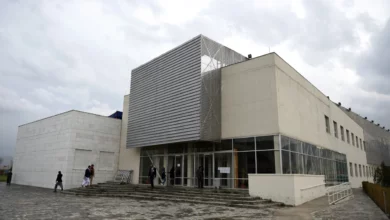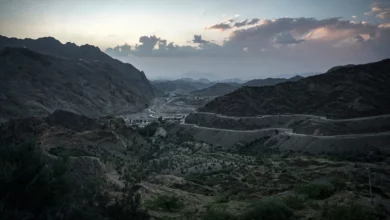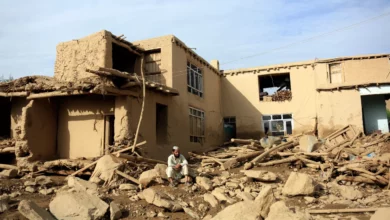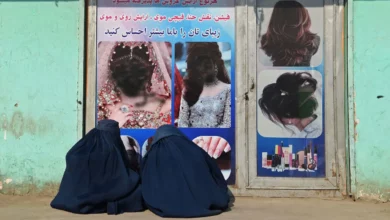London–Will one more international conference help Western forces regain the upper hand in the desperate battle for Afghanistan?
That is the hope of Afghan President Hamid Karzai and 60 foreign ministers gathering in London on Thursday to look for ways to turn around the faltering war effort and speed the snail-paced reconstruction program.
"The conference will be a major opportunity for Afghanistan to explain to the rest of the world our plans for reconciliation and reintegration," Karzai said in Turkey on Tuesday. "Afghanistan is in the frontline of the war on terror. The Afghan people are giving daily sacrifices in this struggle."
The conference will see the unveiling of an ambitious plan to sap the Taliban insurgency by convincing some of its lower and mid-level fighters to lay down their weapons in exchange for money, job training and other financial incentives.
The long range goal is to create order from chaos: to transform Afghanistan into a relatively stable country with a functioning, credible government and no camps or canyons where Al-Qaeda’s fugitive leaders can hide and plot.
The likelihood of immediate success: next to nil. Even if things work out, it will take several years at least for poorly paid and loosely trained Afghan security forces and police to be ready to take control of their battered country, bled dry by on-and-off warfare for the last three decades.
No one pretends the war is going well: Western casualties are up, public support in coalition countries is down, and ever-bolder Taliban rebels have successfully attacked the center of Kabul, power base of the feeble central government led by Karzai. Al-Qaeda leaders, on the run for eight years, have regrouped, their tentacles grasping beyond their base near the Pakistan-Afghan border.
The conflict is at a crossroads, with America and its NATO allies sending 37,000 more troops in a bid to blunt the Taliban’s momentum as the Afghan government seeks financial help with ambitious plans to "Afghanize" the conflict by taking over security duties in the next five years.
The reconstruction effort is getting a boost as well. NATO Tuesday named Mark Sedwill, who was Britain’s ambassador to Kabul, to be its new civilian representative in Afghanistan. He will be charged with administering reconstruction projects and act as a civilian counterpart to the military commander, US General Stanley McChrystal.
German Chancellor Angela Merkel announced plans to boost its troop strength, in order to provide more training for Afghan forces, and to nearly double Germany’s reconstruction aid to Afghanistan, increasing it from euro220 million to euro430 million per year.
Despite gloomy reports from the battlefield, there are glimmers of hope — with polls showing most Afghans now blame the Taliban, not Western forces, for the bloodshed and instability, a reversal from just a year earlier.
Still, it is not clear if the plan to persuade Taliban fighters who are not linked to Al-Qaeda to give up their weapons and join the political process–a centerpiece of the conference agenda–will be successful even if participants make money available. Taliban leaders say the plan is doomed.
The Afghan government plans to offer jobs, vocational training and other financial incentives to Taliban soldiers willing to switch sides. The goal is to reach out to 20,000 to 35,000 insurgents–but skeptics doubt whether large numbers would desert at a time when many insurgents believe they are winning.
Some militants believe they can outlast Western forces, which may be called home due to budgetary restraints and ebbing public enthusiasm for the mission. President Barack Obama says he plans to start withdrawing some US troops by July, 2011.
The conference is also expected to endorse a new timetable for expanding Afghan security forces and giving them control of various parts of the country as part of a plan to reduce Western troop levels by the middle of next year if possible. The top diplomats, including US Secretary of State Hillary Clinton, will also discuss ways to channel more international aid directly through Afghan ministries while, at the same time, working to curb systematic graft and bribery inside the government.
The London conference, which may name a top civilian coordinator for Afghanistan, is also designed at least in part to bolster two leaders in trouble.
British Prime Minister Gordon Brown, facing a difficult election campaign, hopes to bolster his leadership credentials, and Karzai–damaged by electoral fraud and unable to win parliamentary backing for his Cabinet choices–plans to demonstrate that his government still has strong international support.
There are some reasons for confidence even though the numbers of soldiers killed in roadside attacks has steadily increased in the last 12 months.
Analysts believe the troop surge ordered by Obama and new tactics aimed at winning over ordinary Afghans pushed by McChrystal, the top commander in Afghanistan, may blunt the Taliban’s recent gains.
Michael Codner, director of the Military Sciences Department at the Royal United Services Institute in London, said the additional troops may convince on-the-fence Afghans not to back the Taliban.
"It is quite likely the surge could bring a tipping point in the right direction rather than having it muddle along forever," he said. "The situation before looked pretty feeble and doomed."
Codner said the number of troops being added is adequate for the task they face.
He cautioned that public support for the war, at least in Britain, has dropped because there is little confidence in Brown’s assertion that the fighting will help protect British towns and cities from Al-Qaeda attacks.
"There’s a great deal of skepticism," Codner said. "That’s because the mission is not clear. The government is saying it is direct security, that al-Qaida will set up there again if we don’t do this, but unfortunately the public feels if we do these operations, we’ll get an asymmetric attack at home, as in the 7 July bombings."
He was referring to the 7 July, 2005 attacks on the London transit system that killed 52 people. The coordinated bombings by radicalized British Muslims were blamed by some on Britain’s involvement in the wars in Iraq and Afghanistan.




